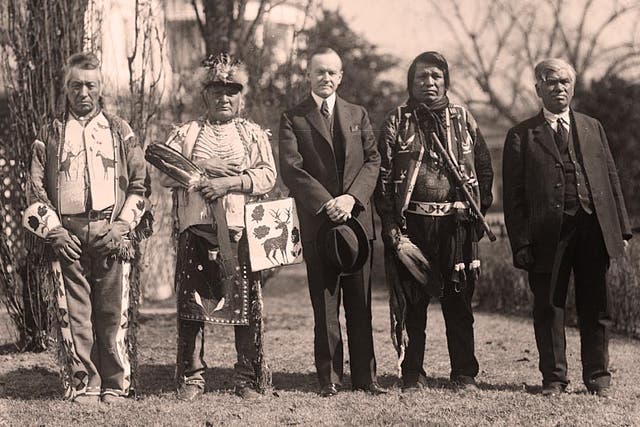
Native Americans won U.S. citizenship in 1924, but the struggle for voting rights stretched on for much longer.
Updated: November 7, 2023 | Original: November 6, 2018

Indigenous tribes in America practiced self governance long before the United States was founded in 1776. Despite this reality, Native Americans endured centuries of struggle before securing U.S. citizenship—and voting rights.
Native Americans couldn’t be U.S. citizens when the country ratified its Constitution in 1788, and wouldn’t win the right to be for 136 years. When Black Americans won citizenship with the 14th Amendment in 1868, the government specifically interpreted the law so it didn’t apply to Native people.
8 Incredible Inventions of the Indigenous People of the Americas“I am not yet prepared to pass a sweeping act of naturalization by which all the Indian savages, wild or tame, belonging to a tribal relation, are to become my fellow-citizens and go to the polls and vote with me,” argued Michigan Senator Jacob Howard at the time, according to the Native American Voting Rights Coalition.
Some Indigenous people didn’t seek U.S. citizenship since they were already part of their own sovereign nations. However, these nations still found their land and the lives of their people subject to the whims of a country that would not recognize them as citizens.
In 1924, Native people won the right to full citizenship when President Calvin Coolidge signed the Indian Citizenship Act, also known as the Snyder Act. But many saw the act as a way to break up Native nations and forcibly assimilate them into American society. A key part of this movement was forcing young Indigenous people to attend boarding schools. As Carlisle boarding school founder Richard Henry Pratt said in 1892, their mission was to “kill the Indian in him, and save the man.”
After centuries of devastating government policies, American Indians had someone in the White House willing to return tribal land, listen to grievances—and support their autonomy.
There are more than nine million Native Americans living in the United States, representing hundreds of tribal nations with diverse languages, cultures and traditions.
After the Japanese invaded the Aleutian Islands, Indigenous volunteers helped form the Alaska Territorial Guard.
In any case, Congress didn’t guarantee Native people voting rights at that time either. The Constitution gave states the right to determine voting rights (with the exception of the 15th and 19th Amendments, which many states violated anyway by preventing Black people from voting).
There were plenty of white Americans who didn’t want Native people voting in their states. In the late 1930s, “One of the Indians went over to Old Town once to see some official in the city hall about voting,” reported Henry Mitchell, an “Indian Canoe Maker” in Maine. “He said to the Indian, 'We don't want you people over here. You have your own elections over on the island, and if you want to vote, go over there.’”
Native Americans were only able to win the right to vote by fighting for it state by state. In fact, efforts to disenfranchise Native Americans, particularly those who lived on reservations, continued through the early 1960s.
In 1957, after a challenge by an Indigenous voter, Utah repealed a law that had denied Native Americans living on reservations the right to vote. And in 1962, the Supreme Court of New Mexico struck down a challenge that claimed Navajos living on a reservation in the state should not have been allowed to vote in a 1960 election.
Despite these victories, Native people were still prevented from voting with poll taxes, literacy tests and intimidation—the same tactics used against Black voters. The Voting Rights Act of 1965 helped strengthen the voting rights that Native people had won in every state. However, in 2013, the Supreme Court’s decision in Shelby County v. Holder eliminated the Justice Department’s authority to block changes to voting laws in states with histories of discrimination. In 2019, a federal commission found that at least 23 states had enacted "newly restrictive statewide voter laws."